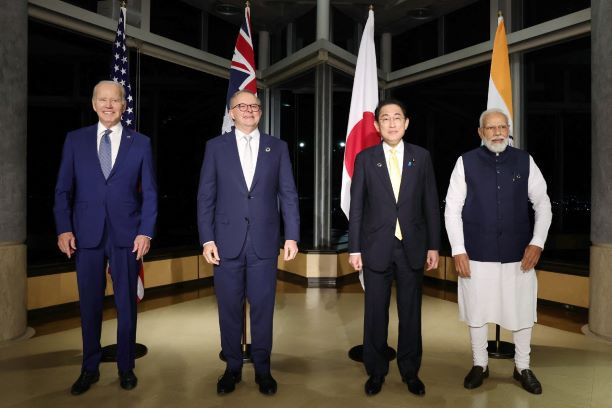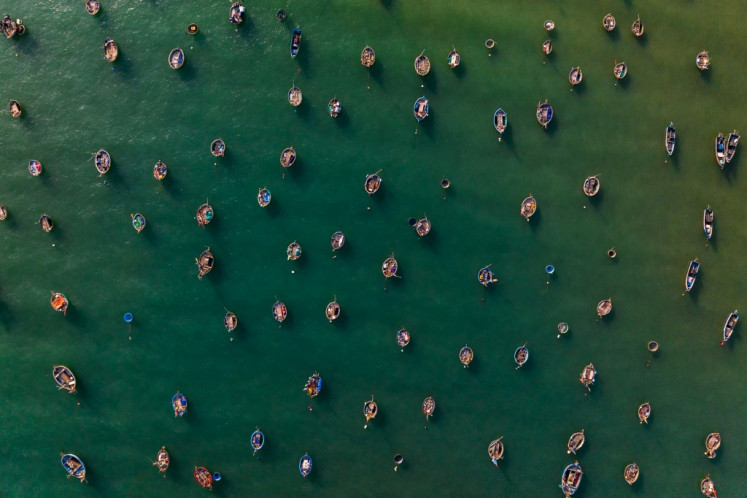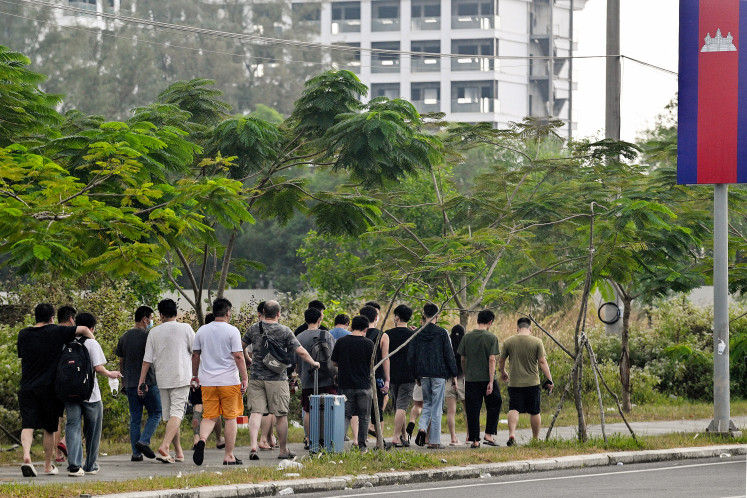Popular Reads
Top Results
Can't find what you're looking for?
View all search resultsPopular Reads
Top Results
Can't find what you're looking for?
View all search resultsQuad continues its outreach to ASEAN, helps build its future
For the first time, the Quad coast guards will launch a ship observer mission in 2025 to improve interoperability and coordination in the Indo-Pacific.
Change text size
Gift Premium Articles
to Anyone
 On the sidelines: Leaders of the Quad strategic alliance (from left) United States President Joe Biden, Australia's Prime Minister Anthony Albanese, Japan's Prime Minister Fumio Kishida and India's Prime Minister Narendra Modi pose for a photo as they hold a meeting on the sidelines of the Group of Seven Summit in Hiroshima, Japan on May 20, 2023. (AFP/Pool/Jiji Press)
On the sidelines: Leaders of the Quad strategic alliance (from left) United States President Joe Biden, Australia's Prime Minister Anthony Albanese, Japan's Prime Minister Fumio Kishida and India's Prime Minister Narendra Modi pose for a photo as they hold a meeting on the sidelines of the Group of Seven Summit in Hiroshima, Japan on May 20, 2023. (AFP/Pool/Jiji Press)
A
t the farewell Quadrilateral Security Dialogue (Quad) summit hosted by United States President Joe Biden in Wilmington, Delaware, the Quad showed clear signs of consolidation. For Biden, it was a fitting tribute, because it was under his presidency that the Quad raised itself to a summit.
Now it has met for the sixth time, twice virtually. Quad foreign ministers have met eight times over the last five years, and Quad commerce and industry ministers and development finance institutions are scheduled to start regular meetings too.
The most prominent message from the Quad summit, thus is that the Quad is here to stay, to undertake collaborative ventures for the public good. Through such functional cooperation, it will maintain a free and open Indo Pacific (FOIP) and challenge all efforts to seek hegemony in the region.
Anchored by shared values, the Quad seeks to uphold the international order based on the rule of law. Respect for the leadership of regional institutions, including ASEAN is embedded in the preamble of the Wilmington Declaration.
The declaration clearly “reaffirms our consistent and unwavering support for ASEAN centrality and unity. We continue to support implementation of the ASEAN Outlook on the Indo-Pacific (AOIP) and are committed to ensuring the Quad’s work is aligned with ASEAN’s principles and priorities.”
“We underscore ASEAN’s regional leadership role, including in the East Asia Summit, the region’s premier leader-led forum for strategic dialogue, and the ASEAN Regional Forum. As comprehensive strategic partners of ASEAN, our four countries intend to continue to strengthen our respective relationships with ASEAN and seek opportunities for greater Quad collaboration in support of the AOIP.”
This is a resounding outreach to ASEAN’s basis and future.
The Quad, four leading maritime democracies in the Indo-Pacific, will engage with forms of functional, technological and related cooperation and engage countries and regional institutions, particularly ASEAN, the Pacific Islands Forum and the Indian Ocean Rim Association.
There are major thrust areas in which Quad consolidation is seen, which will benefit the region. The first of these is in the maritime domain. Given China's pressure on the Philippines, in the South China Sea, all Quad partners strengthened, individually, their relationship with the Philippines and have a common approach, which is not yet a formal Quad approach, but helps in building common understanding.
As many as 25 countries have benefited from the Indo-Pacific Partnership for Maritime Domain Awareness (IPMDA) related to dark vessel movements. They monitor activities in their exclusive economic zone (EEZ), with a particular focus on illegal, unreported and unregulated (IUU) fishing. Most IUU fishing in the region is conducted by Chinese fishing boats guarded by the China Coast Guard, and this is a definite challenge.
This partnership is to encompass maritime security, to cover new technologies and data inflows. Three initiatives in this are now underway. For the first time, the Quad coast guards will launch a ship observer mission in 2025 to improve interoperability and coordination in the Indo-Pacific.
A Quad Indo-Pacific logistics network pilot project is underway. This will seek a combined air lift capacity among Quad partners and leverage logistic strengths to provide high availability disaster recovery (HADR) in the region more effectively. HADR has been one of the cardinal principles since the 2004 tsunami in the region, which brought the Quad together.
This partnership came into play in May 2024, when landslides hit Papua New Guinea and Typhoon Yagi swept Vietnam, Myanmar and other ASEAN countries. For Myanmar, it is mainly an Indian effort, since other Quad members remain aloof from the Myanmar military junta.
Another important and clear challenge is the health partnership. By 2023 this had grown into the Quad Health Security Partnership, which looks at pandemic preparation. The current mpox outbreak is bringing together Quad efforts for equitable access to effective quality vaccines, which will include expanding vaccine manufacturing in developing countries.
The Quad Cancer Moonshot is another important initiative focusing on collaboration, including with private and civil society sectors, to reduce the incidence of suffering from cancer. Initially focusing on cervical cancer, it will work toward other forms.
The Quad countries will collaborate for further research and development to enhance the participation of the private and civil society sectors to reduce the incidence of cancer.
The Quad also wants to improve regional connectivity through quality infrastructure. New partnerships have been enunciated. This includes a partnership for ports of the future. The Quad infrastructure fellowships now cover 2,200 experts and works on disaster resilient infrastructure.
The Quad Partnership for Cable Connectivity and Resilience is providing quality undersea cable networks, which are free from domination. Australia has since July 2024 become a center for building human capacity, while Japan will provide technical cooperation for this, particularly in the South Pacific.
The US is expected to contribute training programs to support cable connectivity, which presently, is focusing on the Pacific Island countries and their requirements. India is working on the maintenance of such cables through harnessing Quad repair capabilities.
Finally, the challenge of critical and emerging technologies is what the Quad is pursuing. The next real battle for the hearts and minds of all the countries in the Indo Pacific is over the access to transparently available and dependable technologies.
Earlier, the open radio access network (RAN) in the Pacific was announced. Now this is being expanded to the ASEAN region, beginning with the Philippines. Japan and the US are supporting the global expansion of the RAN field trials and the Asia Open RAN Academy in the Philippines.
Quad members consult frequently, exchange ideas to advance shared priorities and deliver benefits for partners across the Indo-Pacific. The Quad is here to stay. It is engaging with regional institutions, primarily ASEAN, as a priority.
This is the real challenge, as the Quad initiatives provide viable alternatives for countries in the region so they do not need a total dependence on any one country. The Quad is not sending warships to counter activities in the Indo-Pacific but now into moonshots to build the region’s future.
***
The writer is former Indian ambassador to Germany, Indonesia, Ethiopia, ASEAN and the African Union.










